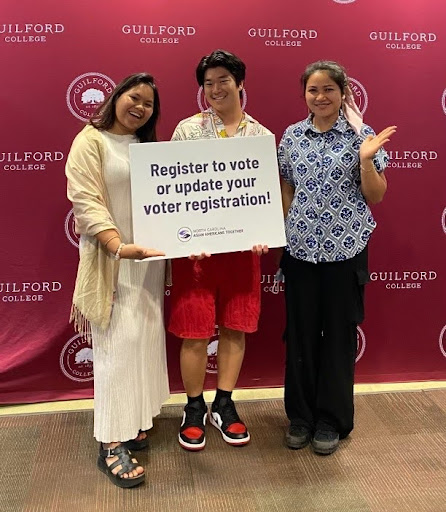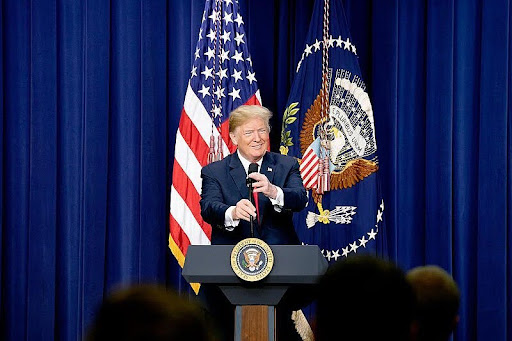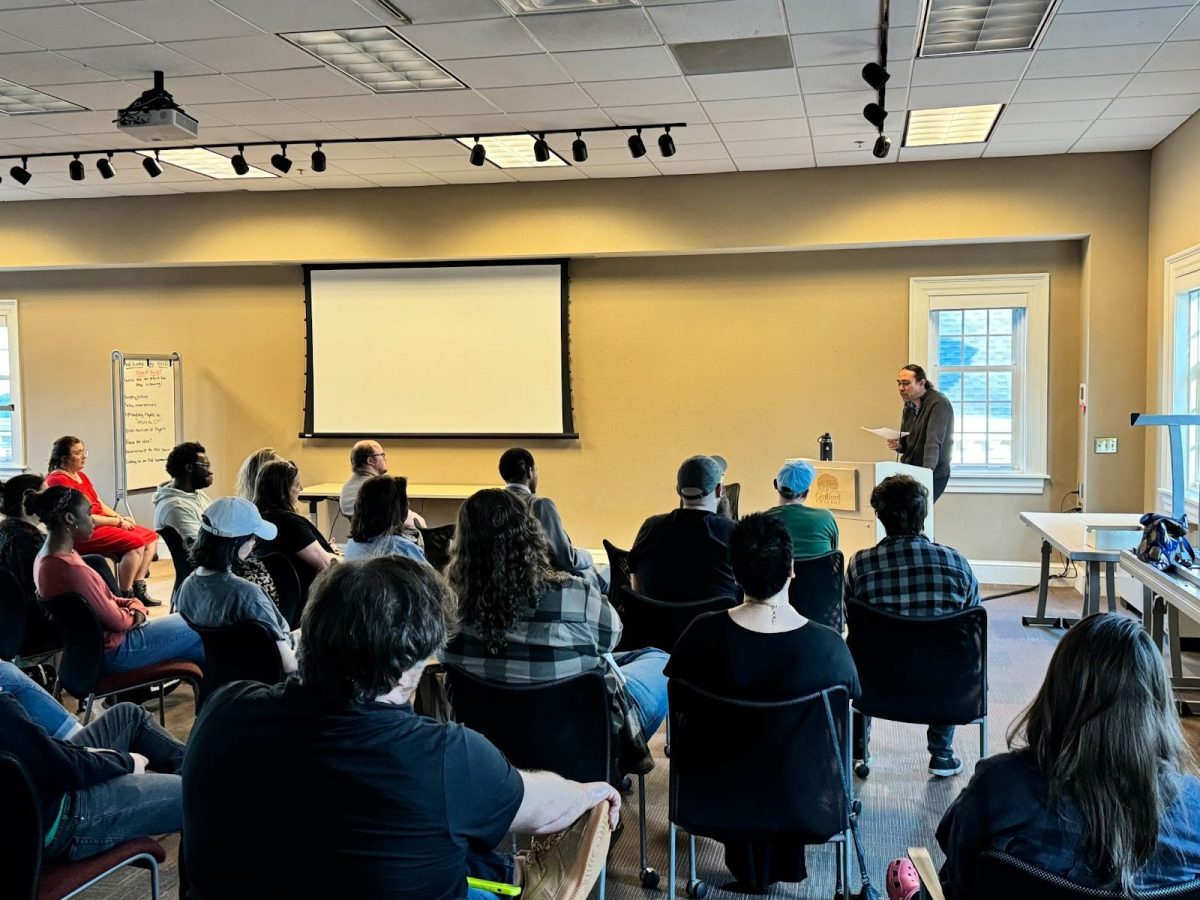On Nov. 4, Edwin Black, an award-winning but controversial investigative reporter came to campus to deliver a presentation titled “Financing the Flames,’’ from his book of the same name, which explores the use of American taxpayer money to fund incarcerated Palestinians who have been imprisoned for anti-Israeli activities.
He has been an active journalist for more than 40 years, published 11 books, and been nominated for a Pulitzer prize nine times. He has also received awards for human rights reporting and been interviewed on numerous television shows in the United States, Europe and Latin America.
In introducing Black, Vice President and Academic Dean Adrienne Israel stressed the value of bringing speakers to campus who represent different points of view, as unpopular as they might be.
“When I was in college, we specialized in challenging people we disagreed with and having these kinds of arguments,” she said “And I kind of miss that at Guilford sometimes. I think we avoid disagreement and feel threatened by it. I remember vividly being in college and having some fiery conversations. I believe that as long as people continue talking to each other, then we have a chance to make progress.”
The Students for Justice in Palestine, however, disagreed with the decision to bring Black.
Black had come in 2011 to give a presentation based on his book “The Farhud–Roots of The Arab-Nazi Alliance in the Holocaust.” Some members of the Guilford community at that time construed his presentation as Islamophobic and disrespectful to the Palestinian community on campus.
In response to that previous Guilford visit, the SJP organized a peaceful walk-out at the Nov. 4 presentation. Prior to the beginning of the talk, they filed East Gallery and stood and sat in complete silence, many wearing signs with the names and ages of Palestinian children killed in Israel’s recent incursion into Gaza. They waited until shortly after Black began his presentation. Then they got up, and left.
“Is this what Guilford has taught you?” called out Dean Rita Serotkin as the students exited the room.
“Yes, what Guilford taught me was to uphold our core values … of justice and equality,” said SJP head Walid, after the event. “The whole purpose of this walkout was to tell people like Black that their presence on campus is not welcome. As a student body, we will not provide our ears to listen to the hate and alteration of information to serve his political agenda.”
Many students and faculty who did not participate in the walkout shared similar opinions, even though they stayed for the entire presentation.
“It’s not the fact that somebody came to the College who was of a different opinion, or who went against prevailing opinions, it’s that somebody came to the College who was so blatantly un-academic,” said senior Matt Carter. “I totally respect the need for different opinions, but someone who is intentionally inflammatory and makes very arbitrary arguments is something I can’t really give a high end to.”
Jeremy Rinker, visiting assistant professor of peace & conflict studies, commented on Black’s ideas of conflict resolution.
“He modeled the exact opposite of what I consider conflict and resolution by dominating conversations, jumping in, cutting people off, not allowing the other side to actually say what they wanted to say,” said Rinker. “I would call it beautiful in the sense that it was modeling the opposite of what I try to teach people. I agree with his last words for the need of dialogue, but when you talk in that kind of name-dropping and book-dropping way, that’s not really dialogue.”
On Wednesday afternoon, after speaking to a journalism class, Black held a Q&A session to allow the community to respond to his previous night’s presentation. However, Black did not accept any “live” questions; rather, he picked questions that had been emailed to him, causing frustration among those present.
Among the questions that Black read were three from Max Carter, director of the Friends Center and adjunct professor of religious studies. In the course of responding, Black challenged Carter and accused him of endorsing the SJP walkout. He also pulled up emails that had been sent to him by a Guilford student who had received emails from the SJP calling Black a “notorious racist” and “Islamophobic” and warning him of the walkout.
“Several students saw those emails, and checked me out, and they know I am not a notorious racist, but a crusader for human rights,” said Black.
After the events, Carter expressed dissatisfaction with Black’s presentations.
“I feel that his hope for coexistence and his statement that ‘all human beings should have the same human rights’ were overshadowed by an overly simplistic view of the conflict and the obfuscation of technical, legal terms that probably confused everybody and clouded the reality that what he is promoting prevents coexistence and equal human rights — so it was frustrating,” said Carter.
In an interview with The Guilfordian after the Q & A, Black said, “The Students for Justice in Palestine exceeded the bounds of decency. They infringed my academic freedom … my constitutional rights to express myself. And they infringed the ability of the students to learn.”
To an SPJ representative who had been present at the Q & A, he said, “I want a full retraction, from your organization (SJP) for calling me a notorious racist. If I had done that to you, in a newspaper, it would be libel.”
On the Friday after Black’s departure, Rinker convened a “healing circle” to offer participants in the previous days’ events an opportunity to recover from negativity and stress they felt the visit had caused.
“Please join friends as we help to mend and strengthen our communities’ relationships by finding ways of collectively sharing our experiences of pain, frustration, and hope in a caring and interconnected way,” said an announcement in the Guilford Buzz.












